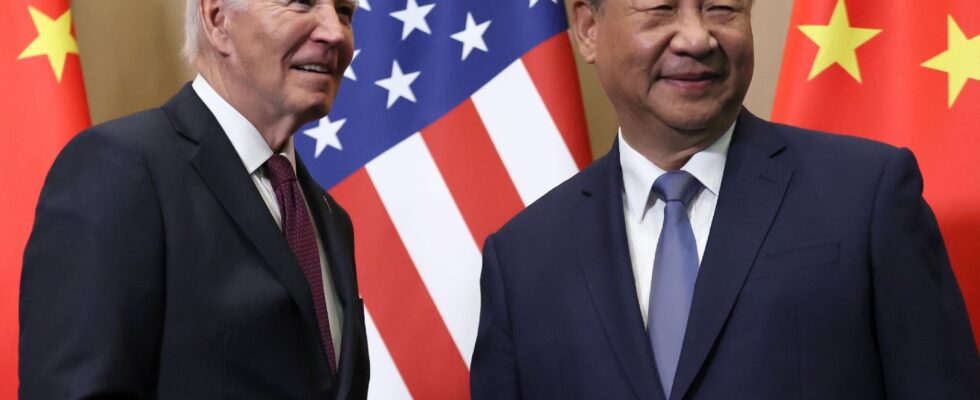In Lima (Peru), this Saturday, November 16, Joe Biden and Xi Jinping met for a final official tête-à-tête before the new administration of Donald Trump comes to power, with whom the Chinese president assured that he would work towards a “smooth transition”.
Washington and Beijing should “continue to explore the right path” to understand each other and “achieve long-term peaceful coexistence”, declared Xi Jinping, quoted by the state agency Xinhua, at the start of their meeting in the Peruvian capital. He assured that China was “ready to work with the new US administration to maintain communication, expand cooperation and manage differences.”
Echoing this, Joe Biden said that the two countries must do everything to prevent competition between them from “drifting into conflict”, during the 1 hour 40 minute tête-à-tête, according to the American presidency, which was held in the hotel where the Chinese president has been staying since Thursday. “Our two countries cannot let this competition drift into conflict. It is our responsibility and, over the last four years, I think we have proven that it is possible to maintain this relationship,” he said. he added.
This meeting between the leaders of the two superpowers was the last before the return to the White House in January of Donald Trump, whose first term (2017-2021) was marked by tensions and a trade confrontation with China. And during his campaign, the billionaire promised to protect American industry, threatening to impose tariffs of 10 to 20% on imported products and up to 60% on those from China. He has also already appointed to his team those who take a hard line against Beijing.
“Frank” conversations
Joe Biden, who is making one of his last major international outings, said he was “proud of the progress made” to stabilize the relationship between Washington and Beijing. “We have not always agreed, but our conversations have always been frank,” he said. The meeting took place at the end of the 31st edition of the Asia-Pacific Economic Cooperation (Apec) summit, which brings together 21 economies representing 60% of global GDP.
The summit saw fears of “protectionism” and “isolationism” expressed by several leaders, in more or less obvious references to the next presidency of Donald Trump. In closed-door discussions in the morning, Xi Jinping called on countries in the region to “unite and cooperate” amid “challenges such as rising geopolitics, unilateralism and protectionism.”
“Denial” and “isolationism”
Already on Friday, Xi Jinping had warned “against the rise of unilateralism and protectionism”, and judged that the world had “entered a new period of turbulence and transformation”. During the same session, Saturday morning, Chilean President Gabriel Boric also called for unity “in the face of the threat of isolationism, of the denial of the climate crisis by some”, but without explicitly mentioning President-elect Trump .
Joe Biden, for his part, estimated Friday, on the sidelines of a meeting with his allies in the Pacific region, Japan and South Korea, that “we have now reached a moment of important political change”. Closing the summit on Saturday, Peruvian President Dina Boluarte welcomed a consensus reached on the “Lima road map”, to “promote the transition to the formal and global economy” from the informal economy, prevalent in several countries. of the region.
Then she handed over the presidency of Apec to South Korea, which will host the summit in 2025. After Lima, Joe Biden and Xi Jinping will travel to Brazil to participate in the G20.
